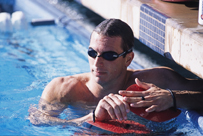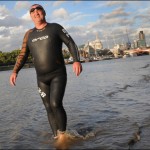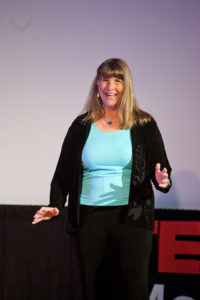I was checking out my swim times today. I had sworn I wasn’t going to be doing this, and that just getting in the half hour a day would be dandy.
And then I thought, “Hey, wouldn’t it be cool to swim from Alcatraz Island to shore? It’s only a mile and a half, why not?”
It isn’t that insane of a swim. People do it all the time. There’s even a triathlon based around it.
But for me, it might be a bit of a challenge. The recommendation is that you should be able to swim a mile in 40 minutes comfortably in the pool before you attempt the swim. This makes sense. Tides are very strong, and you need to be a very strong swimmer to cope.
This morning I swam .68 of a mile in 37:36. That puts me at about a mile in 55:18.
Friends, I have to shave over fifteen minutes off my time before that Alcatraz swim is anything but a really dangerous pipe dream.
Thing is, getting to be able to swim faster isn’t all of it. I need to get a wetsuit, and then train for distance in 55-60F water. Yes, people do the swim without wetsuits sometimes. I’m not all that interested in becoming the next Lynne Cox and am wimping out on the fun of conditioning myself to cold water swimming without one.
Thing is, that does add to the training. First I need to get strong enough in my comfortable 78F pool, then I need to train for the actual conditions of the swim.
I am not an open water swimmer by any means. Not because of any real limitation, but simply from lack of training. So, I am going to be spending the next winter getting my speed up on my workouts, then will be spending the year after that training for cold water, and open water.
Seems kinda goofy to spend two years training for a mile and a half swim, but I’ve spent my entire life in and about the water. I knew before I was potty trained that the beautiful, wonderful pool out there past the sand was a LOT stronger than I am, and that you had to respect it. Not hyperbole. I was sitting in my grandmother’s lap as a toddler on the shore when an unexpected wave knocked us rolling. Fortunately my grandmother was comfortable in the water and made it an adventure rather than something scary. A lifetime of incidents large and small have given me a deep respect for water.
While I’m spending this year getting my swimming up to scratch, I am also going to be studying open water swimming in general, what people do to prepare and trying to find a team of people to work with — probably a local swim coach, if I can find someone with some open water experience. I’ve already Lynne Cox’s book on open water swimming and it has some good stuff in it. I’m glad I have read it so early into my toying with the idea of an Alcatraz swim. I figured that all it would take would be to get into shape and some conversations with some locals. While it’s not going to take the preparation an English Channel swim would take, I’m still going to need to do more research than I thought.
Could I dive in and swim a mile and a half in open water to save my life? Probably. Do I want to create an unnecessary emergency situation? God no!
And it’s entirely possible that when it comes down to it, I lose interest in swimming in the SF Bay. It could happen. I could chicken out, or decide I want to spend money on something else (this isn’t going to be cheap, even though my husband is thrilled at the idea of going out to San Francisco in the next couple of years), or any of a number of things.
But at this stage? I can see no down side at all to training for this. So I spend a lot of time trying to swim faster. This isn’t going to hurt me, or have any real negative price. So even if it turns out to be a pipe dream, I do benefit from chasing it at least a little.
I think in general, that’s what this kind of crazy stuff is for. It gets you up and moving even if it doesn’t work out.




